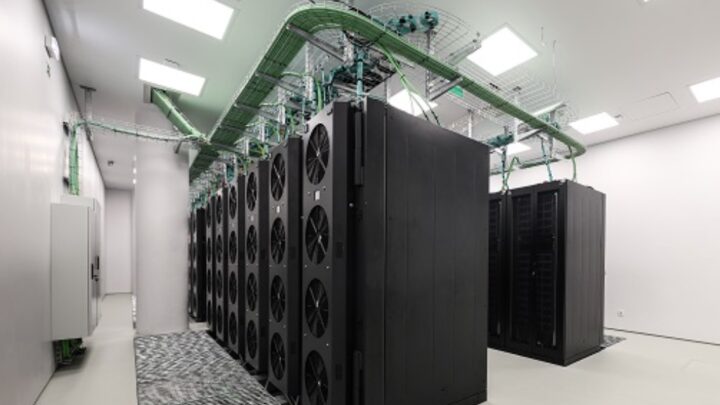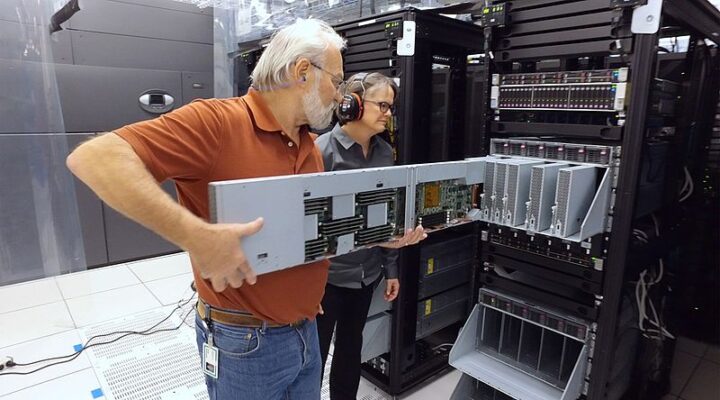The first supercomputer open to the scientific community was installed by the FCT’s FCCN unit in 1988. But Portugal has other supercomputers, some of them recent. Let’s get to know them.
What are the national supercomputers?
All High Performance Computing (HPC) means aim to support applications in various areas, such as bioinformatics, climate, materials and life science, computational chemistry, physics, and civil engineering among others, thus supporting research and enhancing the competitiveness of the national industry.
Deucalion
The Deucalion supercomputer is the fastest in Portugal, capable of performing 10 million billion (ten petaflops) of calculations per second. It is located at the University of Minho, in Guimarães. It increased the availability of high-performance computing capacity in the country tenfold.
Deucalion is capable of carrying out simulations and modeling in the most varied scientific domains, from personalized medicine to the design of drugs and new materials, from observing the Earth and oceans to combating climate change and fires, including the creation of smart cities or autonomous vehicles , the new supercomputer will also contribute to accelerating the analysis of large volumes of data in the field of the latest Artificial Intelligence algorithms.
It occupies two rows of 26 two-meter-high cabinets, at least 1900 meters of optical fiber and 2359 high-speed cables, which guarantee fast processing and a high-performance data storage system, along with high energy efficiency .
The Deucalion in numbers...
- 10 million billion calculations per second
- 1900 meters of optical fiber
- 2359 cabos High-Speed Interconnect
- 26 cabinets of two meters each
- 26 tons
- 20 million euros of investment

Oblivion
It was in February 2020 that the University of Évora inaugurated the Oblivion supercomputer, a machine capable of processing 239 million million operations per second, storing 1.5 Petabytes of data.
The use of Oblivion, incorporated into HPC-UÉ (High Performance Computing at the University of Évora), is divided between the activity of the ENGAGE SKA (Enabling Green E-Science for the SKA Research Infrastructure) consortium and the activity of the scientific community and companies within the scope of the National Advanced Computing Network.

Bob
Opened in July 2019, after being installed in the REN datacenter in Riba d'Ave in Minho, Bob allowed the national computing capacity to increase tenfold, having been provided by the University of Austin, under a partnership that involved the University of Minho and FCT.
Operated by the Minho Advanced Computing Center (MACC), with support from FCT, Bob was replaced by the Deucalion supercomputer.
Navigator
Opened in February 2019, the Navigator supercomputer is integrated into the Advanced Computing Laboratory of the University of Coimbra (LCA-UC). This supercomputer is highlighted by UC as an “important work tool for researchers in areas as diverse as biosciences, materials science, high-energy physics, astrophysics or fluid dynamics”.
Located on the lower floor of the Physics and Chemistry department building, the installation of this laboratory involved an investment of 2.17 million euros. This cluster is part of the Tier-1 network of European PRACE supercomputers and participates in the DECI-17 call. In 2021, the Navigator received an upgrade in cooling capacity and file/back-up system.
Cirrus from Stratus
It is in Lisbon, in the National Distributed Computing Infrastructure (INCD), that we can find the Stratus and Cirrus-A platforms. These have been operated since 2017 by INCD, helping this entity to guarantee High Performance Computing services, through the Cirrus-A cluster. The Stratus cluster comprises the cloud computing infrastructure provided by INCD, widely used for Virtual-Research Environments and installation of Virtual Machines.
These supercomputers are also integrated into the National Advanced Computing Network, managed by the FCCN Unit of the FCT, and, within the scope of the first edition of the Advanced Computing Projects Competition, 129 projects in the most varied areas were able to use these resources.
Portugal integrates its supercomputing resources through the RNCA, which facilitates access to these supercomputers for different institutions and researchers. This network aims to maximize the use of available resources and provide a collaborative environment for high-performance research.
Source: pplware.sapo.pt


